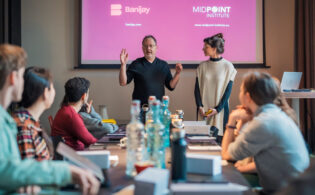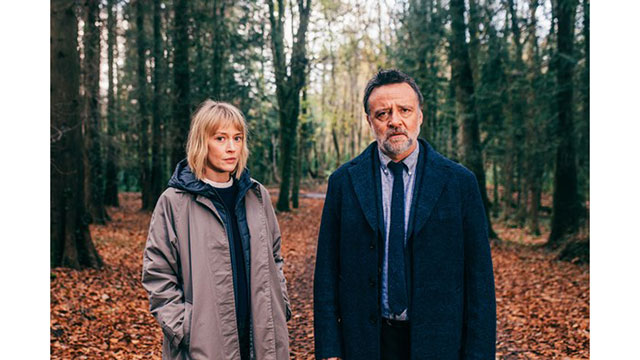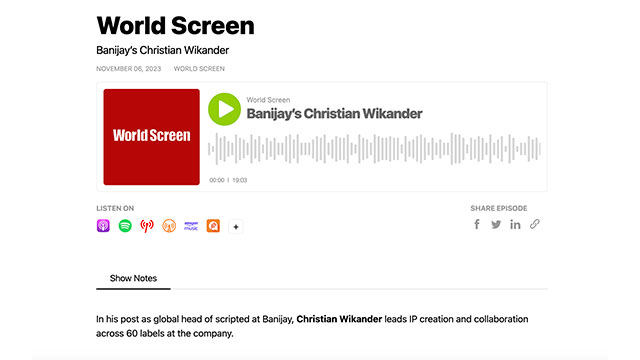In a joint keynote, Lars Blomgren, head of scripted at Banijay, and Karen Wilson, managing director of Kudos, took TV Drama Festival delegates inside the drama development and production process at the company.
The keynote conversation, which you can view here, was moderated by TV Drama’s Anna Carugati. It began with a discussion about the streaming landscape. “This is the first time the streamers have a serious bump in the road,” Blomgren observed. “Even if the end game is to win new subscribers, I don’t see a volume war.”
As subs growth slows amid intensified competition, Blomgren predicts platforms will invest in “fewer bigger projects,” all with top-name talent attached. “We’ve got to be more mainstream and [serve] wider audience groups. And I had a funny conversation with Doug Wood, who is a famous research guru in London. He used the term ‘Silver Surfers’ the other day—people of my age and even older, who are now becoming more and more important. They prefer more linear-like, broader commissions. We’ll also see genre growing rapidly.”
With a likely recession looming and the ongoing impacts of the war in Ukraine, Blomgren says storytelling may move more toward escapism. “The best talent create the trends; they don’t follow them. If that’s the big picture, it’s kind of challenging to be a fortune teller.”
Carugati then asked the panelists about the needs of traditional broadcast channels today. “Every buyer at the moment is looking for premium scripted projects,” said Wilson. “We have a lot more buyers, therefore a lot more opportunity, but we also have a lot more competition. It’s interesting for linear. It’s still an incredibly important place for us to be. The BBC, for example, is adapting to the streaming market. They want to be a place that speaks to its local audience, that serves that public-service broadcaster mentality, but that also is surprising. They want to be in the market for a big-budget show, and they are forming really good partnerships with co-producers in the U.S. in order to allow them to have those windows in the U.K. It doesn’t feel to us anymore that you go to linear for the lower-budget shows and streamers for the higher-budget ones. I think it is more of a taste question.”
On Kudos’ successful approach, Wilson noted, “We don’t develop to brief. We expand where we find our ideas. IP is obviously incredibly important these days where it wasn’t so much. We used to do general meetings with writers and now, in order to get a meeting with the writer, we have to have a piece of IP to get in through the door in the first place. We try to be a great place to work so that once those writers are through the door, we can keep them there. It’s about finding the projects and the writers that we love and the stories that we want to tell and being in a fortunate position in that we can sometimes go straight to scripts if we want to. We are constantly evolving how we pitch our shows. Does it need a script? Does it need a series document? Does it need just a conversation? The broadcasters and the platforms are much more open to risk. If there’s an idea they’re willing to invest in or a writer or story, it doesn’t necessarily need all the trappings of the way that we used to invest money in pitching projects.”
Carugati then asked Blomgren about the lessons learned from creating and producing drama across the Banijay footprint. “It’s almost 55 production companies now. The most important [lesson is] that we have to respect the local culture.” Each territory has its own comfort zone, Blomgren added.
Local successes can of course become global hits, Blomgren noted. “For a series to work outside the originating country, it needs to have a story and characters that relate to the wider audience. And it has to be good.”
The conversation then moved to diversity initiatives at Banijay. “We are all making big steps forward, but I think we still have a huge amount to learn and there’s a lot more to improve,” said Wilson. Kudos has its own diversity, equity and inclusion targets on its productions and is looking at its recruitment processes. “Ultimately, it comes back to breadth of voice, and that comes through in the stories that you want to tell and then the people you hire to make them. Unfortunately, there are limitations to who is available at the moment. So what we also need to be doing is giving opportunities to people to come in and learn and step up. We have got to tell more stories, authentically, by the people who thus far have not had their stories told.”
Blomgren added, “If we open up the business for the unrepresented parts of society, the hardships and challenges they’ve endured create stories that in many ways are much more interesting than my story anyway, it’s a win-win for everyone.”
The discussion then touched on the co-production model, one that Banijay and its various outlets are extremely proficient in. “The ARDs and the BBCs, they all want to do it. Especially on the non-English side, it’s an enormous challenge with the top financing. They all end up on 80, 90 percent of the budget. The final part is really hard to get. That’s the big challenge for everyone. But again, the linear broadcasters are taking the challenge. They really want to compete with the streamers. And this is almost the only way.”
Blomgren and Wilson then discussed how best practices are shared across the company. “We also do a lot of matchmaking across the group,” Blomgren added. For example, the writing team behind Caliphate on Netflix is now working with one of Banijay’s French companies. “If we can move talent and grow talent together, that’s a great opportunity.”
The panel wrapped with Blomgren and Wilson discussing their outlooks for the year to two ahead. “It’s about widening the talent pool we can all draw from,” Wilson said. “It’s talent that we all need. There isn’t quite enough of it yet with all the opportunities coming our way.”
“The situation now with the streamers and their growth actually plays to our advantage because we have a lot of high-end companies and trusted partners with proper track records,” added Blomgren. “In challenging times, you want to have reliable partners. I’m optimistic.”
 TVDRAMA
TVDRAMA






